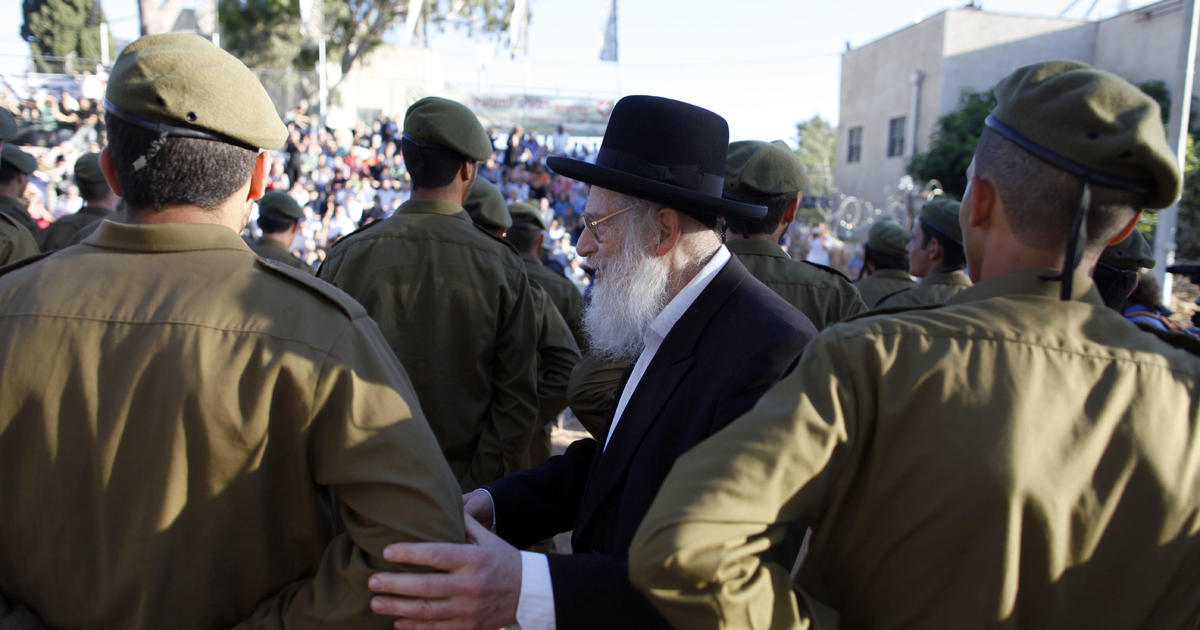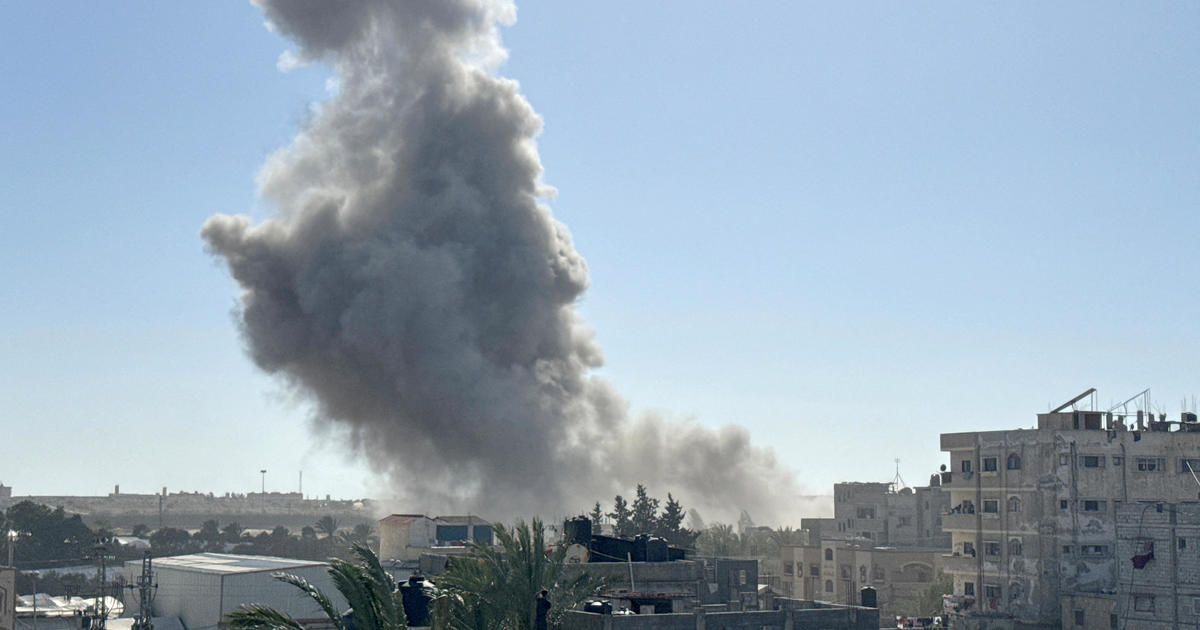Israel bombs "dozens" of alleged Iranian targets in Syria
JERUSALEM -- The Israeli military on Thursday said it attacked "dozens" of Iranian targets in neighboring Syria in response to an Iranian rocket barrage on Israeli positions in the Golan Heights. It was the most serious military confrontation between the two bitter enemies to date.
CBS News correspondent Seth Doane says the purported Iranian rocket attack on the Golan Heights was a potential game-changer. Israel says it was the first time Iran has ever directly targeted Israeli troops. Israel claims none of the 20 rockets made it into their territory; four were intercepted by the "Iron Dome" surface-to-air missile system the Jewish state has been strengthening to fend-off just such an attack.
The deputy of Iran's Supreme National Security Council, Abu al-Fadl Hassan al-Baiji, denied on Thursday that Iran had anything to do with the rocket salvo fired at Israel, according to Arabic media. Neither Iran's Supreme Leader Ayatollah Ali Khamenei, nor Foreign Minister Mohammad Javad Zarif, who often take to Twitter, made any allusion on their social media channels Thursday to the escalating tensions.
Israel said the targets it hit inside Syria included weapons storage, logistics sites and intelligence centers used by elite Iranian forces. It also said it destroyed several Syrian air-defense systems after coming under heavy fire and that none of its warplanes was hit.
The blistering Israeli assault was by far the most intensive Israeli action in neighboring Syria since the civil war broke out there in 2011. Israel has largely tried to stay on the sidelines, but has previously acknowledged carrying out over 100 airstrikes over the past seven years, most believed to be aimed at Iranian weapons shipments bound for the Hezbollah militant group.
But with the civil war appearing to wind down, and Iranian forces looking to establish a foothold on Israel's doorstep, Israel has stepped up its response. Speaking at the Herzliya Conference, an annual security gathering north of Tel Aviv, Defense Minister Avigdor Lieberman said Israel would response fiercely to any further Iranian actions.
"We will not let Iran turn Syria into a forward base against Israel. This is the policy, a very, very clear policy, and we're acting according to this policy," he said. "We, of course, struck almost all the Iranian infrastructure in Syria, and they need to remember this arrogance of theirs. If we get rain, they'll get a flood. I hope that we ended this chapter and that everyone understood."
Asked by "Face the Nation" moderator Margaret Brennan on Thursday whether the U.S. had expected Iran to lash out after the White House decision to pull out of the nuclear deal, Vice President Mike Pence said the they had "been anticipating the potential for some Iranian reaction" since Israeli struck Iranian targets in Syria "a couple weeks ago."
"We stand by Israel's right of self-defense to protect its nation, its people, and its sovereignty," the Vice President said, adding that, because the Iran nuclear deal "didn't check the aggressive influence of Iran across the region is exactly why Iran is in Syria. It's exactly why you have Iranian forces and Iranian missiles that have positioned in Syria as that nation's been swept up into a bloody civil war."
The White House followed up with a statement saying, "Iran's Islamic Revolutionary Guard Corps (IRGC) bears full responsibility for the consequences of its reckless actions, and we call on the IRGC and its militant proxies, including Hizballah, to take no further provocative steps."
In London, British Foreign Secretary Boris Johnson released a statement later Thursday condemning, "in the strongest terms the Iranian rocket attacks against Israeli forces."
"We strongly support Israel's right to defend itself. We urge Iran to refrain from further actions which will only lead to increased instability in the region," said Johnson, adding: "It is crucial to avoid any further escalations, which would be in no one's interest. We also continue to call on Russia to use its influence to press those in Syria to cease their destabilising activity and work towards a broader political settlement."
Iranian state television broke its silence over the Israeli airstrikes late Thursday morning, the start of the Iranian weekend. A presenter announced the Israeli strikes, sourcing the information to Syria's state-run SANA news agency. The broadcaster also described the Israeli attack as "unprecedented" since the 1967 Mideast war.
There was no immediate word on Iranian casualties. Syria's capital, Damascus, shook with sounds of explosions just before dawn, and firing by Syrian air defenses over the city was heard throughout the night. Syria's state news agency SANA quoted a Syrian military official as saying Israeli missiles hit air defense positions, radar stations and a weapons warehouse, but claiming most incoming rockets were intercepted. Syrian activists said the onslaught lasted more than five hours.
In recent months, Israel has warned that it will not accept a permanent Iranian military presence in Syria. Iran has accused Israel of carrying out a series of deadly strikes on Iranian military positions in Syria in recent weeks, and had vowed retaliation. Iran has sent thousands of troops to back Syrian President Bashar Assad, and Israel fears that as the fighting nears an end, Iran and tens of thousands of Shiite militiamen will turn their focus to Israel.
Lt. Col. Jonathan Conricus, a military spokesman, said Israel was not looking to escalate the situation. But he said troops will continue to be on "very high alert."
"Should there be another Iranian attack, we will be prepared for it," he said.
Iran's ability to hit back could be limited. Its resources in Syria pale in comparison to the high-tech Israeli military. Iran also could be wary of military entanglement at a time when it is trying to salvage the international nuclear deal.
Earlier Thursday, Israel said Iran's Al Quds force fired 20 rockets at Israeli front-line military positions in the Golan Heights. Conricus said four of the rockets were intercepted, while the others fell short of their targets. The incoming attack set off air raid sirens in the Israeli-controlled Golan, which was captured from Syria in the 1967 Mideast war.
Syria's state media said Syrian air defenses intercepted "hostile Israeli missiles" early Thursday that were fired over southwestern Damascus. Hours later, state-run Al-Ikhbariya TV broadcast a live feed of Syrian air defenses firing into the sky above the capital, and loud explosions and air defense firing were heard through the night.
Syrian activists reported Israeli airstrikes hitting targets near Damascus. One video posted online showed a large explosion and shrapnel flying in the air. Residents reported loud sounds that rocked their buildings. It was not immediately clear what was hit.
Al-Ikhbariya TV said Israel also targeted military posts in southern Suweida province, including an air base, and struck near Homs in central Syria. The state TV station said the attacks were foiled.
Iranian officials offered no immediate comment on Israel's claim about the missile fire.
Syrian media earlier said the hostilities began with Israeli fire at Syrian positions in southern Syria from across the border. Pro-government media said Syrian missiles were then fired at Israeli forces. One TV station, Beirut-based Al-Mayadeen, said at least 50 missiles were fired from Syria at Israeli forces in the Golan Heights. Al-Ikhbariya TV said missiles targeted 10 Israeli positions.
Syrian media said it was the first time in years that Syrians had fired at Israeli forces in the Golan Heights.
Late Tuesday, Syrian state media said Israel struck a military outpost near Damascus. The Britain-based Syrian Observatory for Human Rights said the missiles targeted depots and rocket launchers that likely belonged to Iran's elite Revolutionary Guard, killing at least 15 people, eight of them Iranians.
Last month, an attack on Syria's T4 air base in Homs province killed seven Iranian military personnel. On April 30, Israel was said to have struck government outposts in northern Syria, killing more than a dozen pro-government fighters, many of them Iranians.
Israel considers Iran to be its most bitter enemy, citing Iran's hostile rhetoric, support for anti-Israel militant groups and development of long-range missiles. President Donald Trump's withdrawal from the international nuclear agreement with Iran, with strong support from Israel, has further raised tensions.
Israel and Iran have appeared to be on a collision course for months.
In February, Israel shot down what it said was an armed Iranian drone that entered Israeli airspace. Israel responded by attacking anti-aircraft positions in Syria, and an Israeli warplane was shot down during the battle.
Israeli Prime Minister Benjamin Netanyahu traveled to Moscow on Wednesday to meet with President Vladimir Putin and discuss military coordination in Syria.
Russia has also sent forces to Syria to back Assad. But Israel and Russia have maintained close communications to prevent their air forces from coming into conflict.
Together with Putin, Netanyahu toured a parade celebrating the anniversary of the World War II victory over the Nazis and then met the Russian president at the Kremlin for consultations.
After 10 hours together, Netanyahu said he conveyed Israel's obligation to defend itself against Iranian aggression.
"I think that matters were presented in a direct and forthright manner, and this is important. These matters are very important to Israel's security at all times and especially at this time," he said.



